Meet the roadies
Words: Elisabeth Marie
Pictures: Andre Castellucci
Gigs don’t happen without an army of cargo-shorts-wearing, lanyard-toting roadies keeping the sound in check, lights on time, and stages built to a structurally sound standard.
Robert Middleton
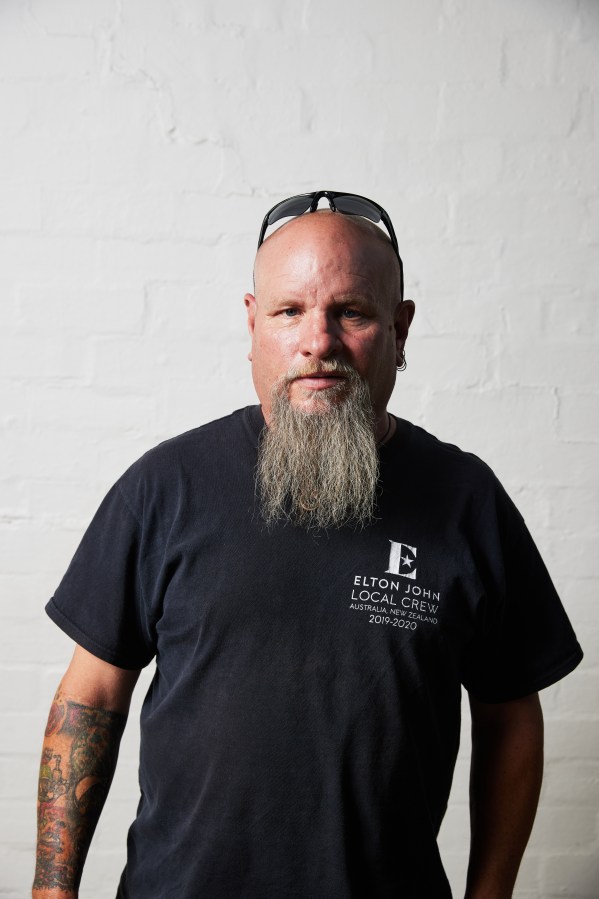
How did you get into the industry?
I started off in school. I used to play guitar so I played and sang in a band for a while and met some people in the industry and got into it that way.
What does the average day on the job look like for you?
We will usually get up and get started around seven or eight o’clock and take five or so hours to load in. Then we will go home, depending on if we have a show call when we stay for the whole day changing over the bands. We go back at 11 o’clock when the show is finished, or we can go in and watch the show for a little while if we want to and work for about three or four hours, depending on the size of the show, and then head home.
Where have you travelled for work?
I have only been interstate a couple of times. We are a local crew, so we tend to stick around Adelaide. I have been to Sydney and Melbourne.
Who have you worked alongside?
I always remember Dolly Parton’s crew. They were really chilled out and easy to work with. The bands that have been around for a long time have crews that have been with them for a long time, so they’re usually more chilled out and easy-going.
What is the worst part of your job?
The lifting.
What is the best part of your job?
Seeing the shows. Seeing it built and seeing everybody enjoying it. I get a big thrill out of the audience seeing the show because I feel like I have pitched in and done something really cool.
What should people know about the industry?
There is no industry at the moment.
Do you miss it?
Shit yeah.
Colin Moore
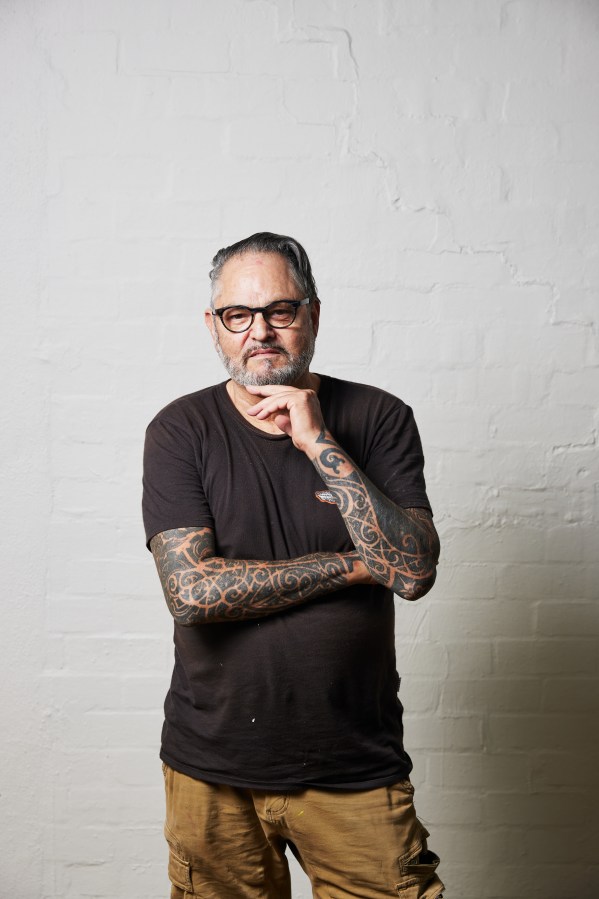
How did you get into the industry?
It is so long ago now it is difficult to recall. I think a friend mentioned there was work at EPA and I rang and got some work.
What does the average day on the job look like for you?
With the bands it is pretty standardised. We rock up, unpack and set up. I usually do the same thing every time, which is put the video screens together, which is pretty straightforward, just putting screens in and attaching cables. Then you come back at night and do it all in reverse. Put everything in their boxes, put the boxes in the truck, say ‘Goodbye!’ and go to bed.
Where have you travelled for work?
I am pretty well Adelaide based.
Who have you worked alongside?
My favourite was Queens of the Stone Age, and I also worked with Pink. She is awesome. Black Sabbath, AC/DC, KISS – it goes on and on and on. I’ve done The Wiggles and Disney and Phantom of the Opera. They’re a little different from Black Sabbath.
What is the worst part of your job?
When you’re working a long day, your boss keeps asking you to stay on. It’s been 18 hours, you’re standing on your feet still – that’s a drag. But you know it won’t last forever.
What is the best part of your job?
The best part is seeing the bands, of course. That’s a real bonus. One of the best performances, because I was never a big Pink fan, but I remember, I walked out the back of the concert and could hear her singing ‘Whole Lotta Love’, which is a Led Zeppelin song, and thought, ‘Wow, she is belting this out’. So, I went around to have a look and she was hanging from the ceiling, upside down, spinning around and singing this song. I thought, ‘That’s as good as it gets’.
What’s the most exciting thing that has happened while on the job?
When the boss has turned around and said that we are getting lunch provided, that’s exciting! I love food.
What can people do to support the industry?
Allow bands to go touring again.
Qais Zawawi Read
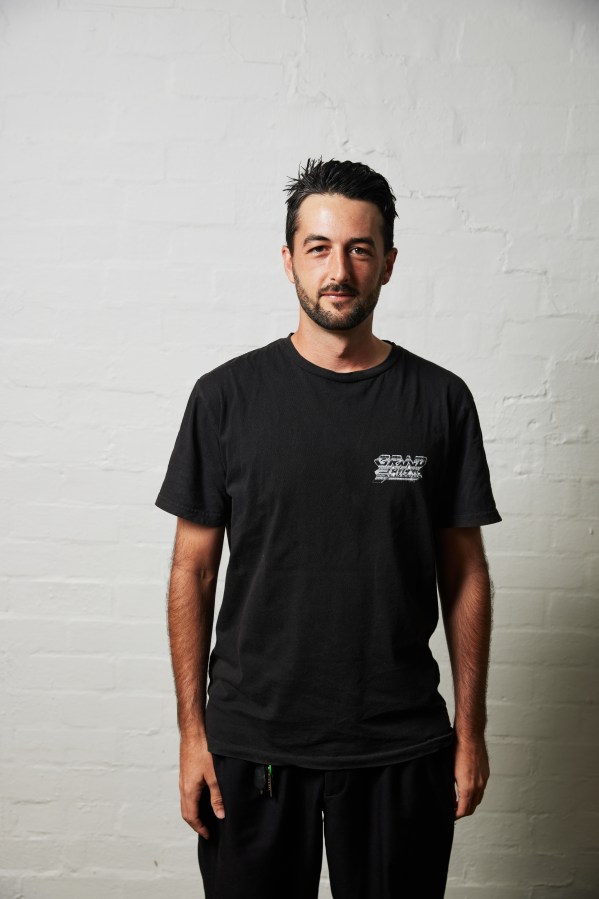
How did you get into the industry?
I did my masters in film and television and finished right at the start of the pandemic, when the industry was turned on its head. I went back to working in a café for the first year of COVID, but finally had a really bad day and just sent a bunch of emails out to people I knew asking if there was any work. Novatech got back to me and I’ve been working there ever since.
What does the average day on the job look like for you?
Typically, if we are doing a smaller gig from start to finish, we prep all the gear in the warehouse the day before. The project manager will make a list of everything we need and we make sure it is all available in the warehouse before packing it up and putting it in the truck. We hop into the truck and take the stuff to the venue and set it all up, which takes most of the day, and then the gig is usually in the evening. If the gig is a lot bigger it can take a few days to set up and use most of the gear we have in our warehouse. Sometimes your shifts can end up being 15 or 16 hours long, but that is just the nature of the job.
Who have you worked alongside?
I have done the soccer at Coopers Stadium. I have done the Big Bash and a bunch of gigs at the Entertainment Centre during the winter, and lots of outdoor festivals during the summer.
What is the worst part of your job?
Managing your personal life, because of the volatile nature of the industry. It can be hard to plan personal things and have hobbies because we are on call 24/7 and don’t have set days off throughout the week. Our days off are spread out throughout the week, but they’re not consistent, so it can be hard to plan regular things. Let’s say you want to play tennis every Tuesday, you are probably going to get screwed over at some point.
What is the best part of your job?
Being very nervous at the start of a gig and then actually being able to pull it off.
What can people do to support the industry?
If you can buy tickets to a gig, just do it and go along. Also be sure to support the up-and-coming bands, because it’s a really difficult time to get started in the industry.
Suneil Pusari
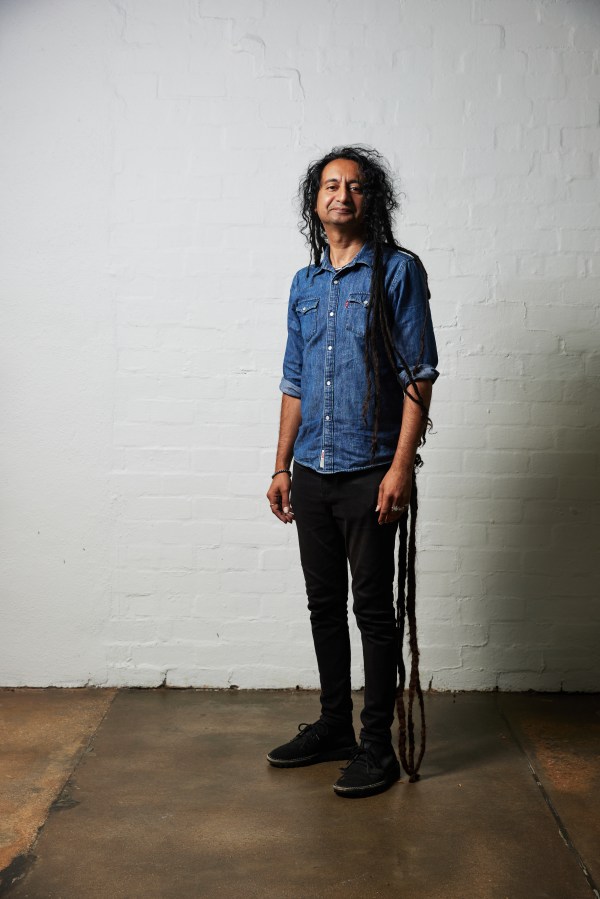
How did you get into the industry?
I started helping friends’ bands when they were doing live gigs or recording demos. When I was living in London, I was living above a pub and there was this kid that was also staying in the pub and he worked at a venue and he said I should come down to the venue and check it out. It was a super cool little venue, and everybody that worked there was super young and it was very exciting seeing a lot of bands. I started working there for a couple of nights a week and it just escalated from there.
What does the average day on the job look like for you?
Pretty early starts with at least one or two coffees. I have the advantage of having people who assist me in getting the gear in before I arrive, so I can just come along and annoy them by asking them to help me move stuff around before I set it up. I will then stuff around for a bit before working on the show. Then we pack down and get out of the venue around one o’clock. If there is anywhere open, we will go grab a drink. Otherwise, we have a few drinks on the bus and get ready to do it all again in a different place in a different city.
Where have you travelled to for work?
I have been around most of the world. I am still yet to do shows in Africa and India. They’re the two places I think I would be really intrigued to do shows in.
Do you have a favourite place to do shows?
Japan, for two reasons. Firstly, it’s technically amazing. Secondly, Japanese people react to music very differently to anywhere else in the world, and it takes a bit of getting used to, but it’s really rewarding doing shows there. I also just love Japan, it’s such a great country.
Who have you worked alongside?
Because I am freelance and I don’t have a lot of management, I have always chosen the people I work with. I really love working with Rufus Wainwright because he would always challenge me to do different things. Lily Allen is great to work with, she is a really incredible person to work with and she stands for a lot of the right things. Just for sheer chaos and fun and touring with a really crazy schedule and really crazy fans and really crazy situations, The 1975.
What is the worst part of your job?
How long you spend killing time and waiting around in places and travelling. Working is actually only a very small amount of what you do in your time away.
What is the best part of your job?
Doing shows with people you really like and seeing the different emotional reactions from crowds. You feel like you’re a part of something special, and I love that the feeling of being at a gig can’t be replicated.
What’s the most exciting thing that has happened while on the job?
I’m not sure if I would say exciting, but quite a while back we were doing shows in Russia and most of the show producers were basically Russian mafia. We missed a show and they held our passports until we did a national television broadcast apologising for missing the show and saying that we would reschedule it soon. Only after that did they return our passports.
What should people know about the industry?
I think there is a misconception that it is all glamour and rock ‘n’ roll. There are elements of that, but 90 per cent of it is really hard work and there are a lot of hours and a lot of travel. It’s not suited to everybody. You have to be quite nomadic.
What can people do to support the industry?
I find it is a really supportive industry, which has been really apparent in the last couple of years when people are struggling. There has been funding set up and companies giving to crew people, because there was no government support. I was amazed to see that we were being supported better by strangers and other countries than by our own government. The best thing people can do is when shows are being advertised, buy tickets ahead of time because it shows the want and need of the live industry. If people are feeling more generous, there are quite a few charity organisations to help crew members individually. In quite a few countries, there have been petitions for the government to back insurance companies, because one of the main issues for people touring is they can’t get insurance if the shows are cancelled, and the bigger the show the more cost to the band. So, if they can’t get insurance, they can’t tour.
Mike Longmire
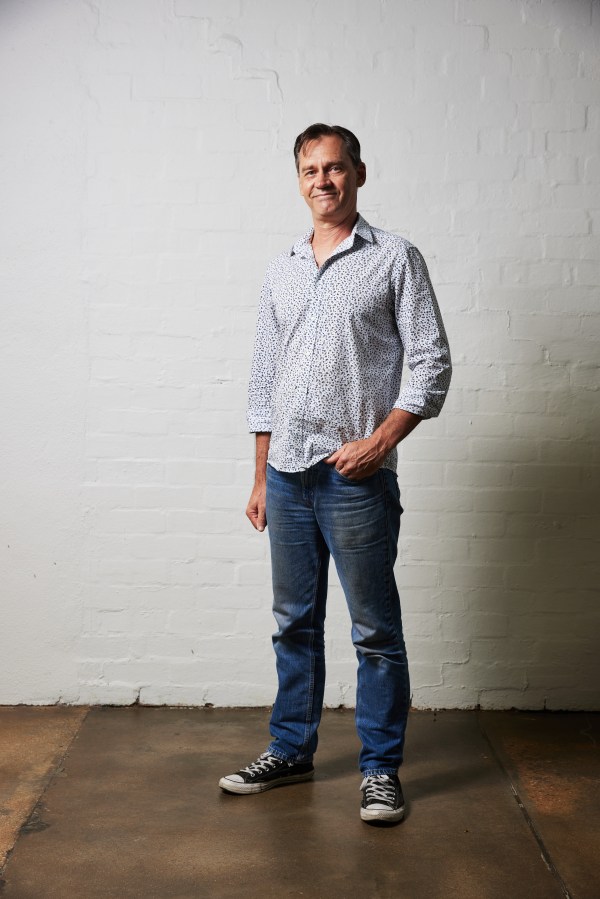
How did you get into the industry?
I had access to a ute and went to see a band one day and they talked me into getting me to help them with their gear. That was in 1981 and I just kept doing it.
What does an average day on the job look like for you?
At the moment, nil. In the good old days, it could spread across a number of days when you’re doing a lot of preparations for CAD drawings and spreadsheets for stage layouts and that sort of thing. You’ll generally come into a venue anytime from midday and 2pm and get sound checks and so on out the way before the performance. And we are usually out again by midnight to two o’clock.
Where have you travelled to for work?
I have been all over the place, but mostly travelling around Australia.
Who have you worked alongside?
Everybody from Shirley Bassey and Glen Campbell to Daryl Braithwaite in his bigger times in the ‘90s. I was fortunate enough to be associated with the Governor Hindmarsh for six or so years, and you would have that many fantastic acts coming through. It’s just a never-ending parade of people that you really admire.
What is the worst part of your job?
There are things that annoy you when they’re happening, but they’re little things that are just part of a job that is overall gratifying.
What is the best part of your job?
When the people cheer.
What’s the most exciting part of the job?
I used to do a lot of work in entertainment centres and they’re just big, cold sheds when you go in there in the morning. The place is empty and it feels like a cavern and it’s cold with the hard concrete floors. Then the trucks start coming in and the loaders are there emptying the trucks and there is a slight hum of activity spreading around. Things start to take shape as the video walls go up and the PA goes into the air and you’re pushing play and doing soundchecks on the microphone. The energy level is just lifting, lifting, lifting throughout the day, and there are people arriving and they’re full of expectation, looking for their seats or where is best to stand near the stage without getting crushed. Then the lights go down and you hear this whoosh-bang and the concert gets started. Afterwards, the people are walking out and they’ve got these huge smiles and they’ve just shared this amazing experience. The big white lights come on and we start to tear everything down and we start to back up and the guys are pushing everything out and it becomes this big, cold, empty shell again. You know that you have transformed the building, but you have also transformed people’s lives, even if only for a couple of hours. That’s what is so exciting.
What should people know about the industry?
It’s rare to become friends with the band. You’re working for them and it’s a relationship. Sure, it can be a wonderful relationship, but don’t always be there just because you love the stars.
What can people do to support the industry?
Go to the shows that you can, get vaccinated, and wear a mask even though it is a pain in the arse.
Nathan D’Agostino
(No relation to Cosi D’Agostino, below)
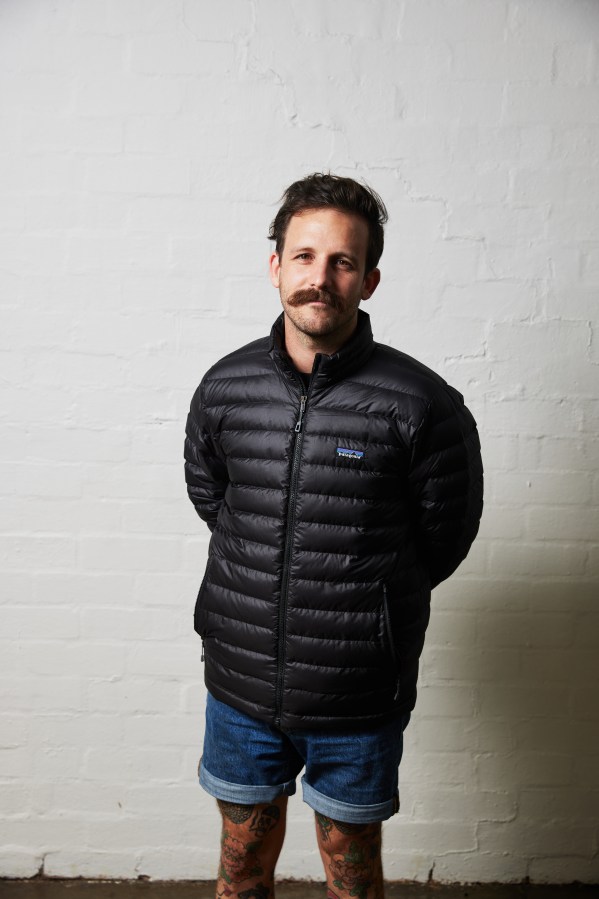
How did you get into the industry?
It’s quite a long story but as simple as possible: I grew up in the country and my dad was in a band all his life, so I got into music. I ended up being the only guy in my music class in school and the whole school got me to move stuff around and manage the PA system, and I realised I could make a career out of it. I finished school and went to Adelaide and studied Stage Management and Theatre at AC Arts, moved into theatre production management after that and got into rock and roll stage management and backline after that. After that, I hustled and hustled, and now I am a national stage manager for touring large events.
So you kind of started as a roadie for your dad?
I guess, because we always had the gear at home, I knew how to use it all. In year nine at school, I would get pulled out of class to come set up all the stuff for the year 12 productions.
What does the average day on the job look like for you?
It differs a lot depending on if I am advancing a show or if I am on the show. From the production manager I do pretty much all of my work from a home office. When we get to the shows it is early mornings getting everything in, making sure the schedule is running well. We do the show, get it back out. It differs whether you’re doing a festival or if you’re on the road touring with a band. There is no average day.
Where have you travelled to for work?
Mostly domestically, but every city and town in Australia many times. I haven’t worked much internationally yet, and don’t really plan on it because I have such a stronghold in my industry here at the moment, and I love where I am and the people here. But I will one day.
Who have you worked alongside?
As a production manager you can think of any Australian band in the last 10 or 15 years that have been of relevance and they would have been on my stage. Because you see them all the time, you kind of become mates with the crew and mates with the band.
What is the worst part of your job?
There is always a lot of uncertainty. A lot of the people that work in the industry are freelance and it’s dicey. It’s scary waiting for work to come around.
What is the best part of your job?
The people you meet and the relationships you keep.
What’s the most exciting thing that has happened while on the job?
It’s always exciting. It never gets old, even though you’re playing the same sets with the same bands. But it is always different and always exciting.
What should people know about the industry?
I think from the outside it looks like a 24/7 party and that everybody is living this amazing life – and don’t get me wrong there are aspects of that and it is great – but it is also really fucking hard and we work really fucking hard.
What can people do to support the industry?
There is a great organisation called Support Act that gives out grants to people in the industry who are having a hard time, even before the pandemic existed. So people that are going through financial hardships, like old roadies that don’t have any work but need an operation on their kidney, they’ll help fund that as much as they can. Support Act – it is really important for the industry.
Cosi D’Agostino
(No relation to Nathan D’Agostino, above)
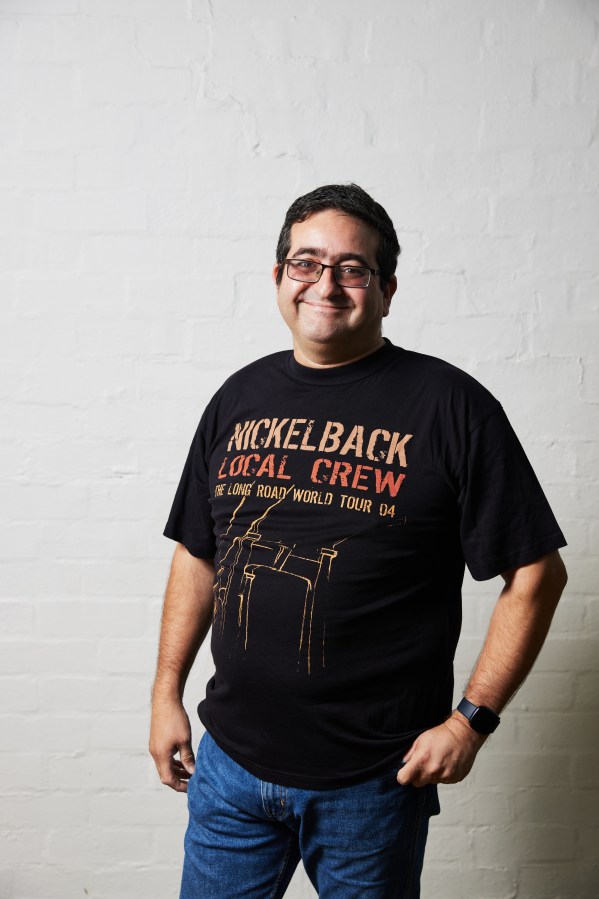
How did you get into the industry?
A friend of mine came up to me one day, drove up my driveway and said, ‘Do you wanna work for Big Day Out?’ And I have been doing it ever since.
What does the average day on the job look like for you?
Unloading all the trucks and helping to set up the gear. Sometimes I will be working during the show doing changeovers and moving props and stuff on the stage. At the end of the night, we pack it all up and send it off.
Where have you travelled to for work?
One year a few of us who were Iron Maiden fans went to WA to do Iron Maiden.
Who have you been able to work alongside?
Iron Maiden, Nickleback, Kiss, Metallica – you name it and I have probably worked on their show.
Who were the best crews to work with?
The Foo Fighters’ crew. They were so awesome.
What is the worst part of your job?
Can I pick a worst part? The worst part is when I am not doing the job.
What is the best part of your job?
The best part is the variety that one day you could be doing a heavy metal show and then the next day you’re doing a pop act like Pink.
What’s the most exciting thing that has happened while on the job?
Sometimes you have to hold the cable while the cameraman goes up and down. So, one day I am just standing there holding the cable and I look up and Dave Grohl is right there.
What should people know about the industry?
It’s not really what you see on the TV where there is a heap of partying-on backstage. There is heaps more work involved in it.
What can people do to support the industry?
Once the actual gigs come back, attend them. Buy your tickets early.
